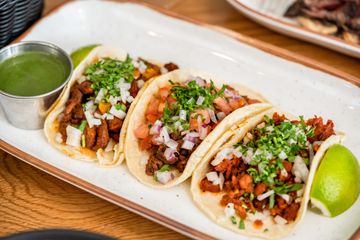Is Mexican Food Healthy? Unpacking the Nutritional Advantages of Conventional Components
The inquiry of whether Mexican food is healthy and balanced invites an expedition of its traditional active ingredients. Beans and corn function as fundamental staples, rich in protein and fiber. Avocados offer advantageous fats, while numerous herbs and spices add taste and health and wellness benefits - churros. Together, these parts produce a tapestry of nourishment. However, the healthfulness of Mexican food commonly depends on preparation approaches and portion dimensions. What duty do these factors play in establishing its general dietary worth?
The Power of Beans: Protein and Fiber-Rich Staples
Frequently ignored, beans offer as a cornerstone of Mexican cuisine, providing a riches of dietary advantages. Rich in healthy protein, they are an exceptional plant-based option for those looking for to meet their dietary healthy protein needs. This high protein content sustains muscle repair service and growth, making beans very useful for both vegetarians and meat-eaters alike. Additionally, beans are an exceptional resource of dietary fiber, which helps in food digestion and promotes a feeling of volume, possibly assisting with weight administration.
The selection of beans used in Mexican dishes, such as black beans, pinto beans, and kidney beans, adds to a diverse taste profile and can boost meals nutritionally. Beans are reduced in fat and have important vitamins and minerals, consisting of iron, magnesium, and folate. Together, these characteristics make beans an important component, delivering both sustenance and sustenance in traditional Mexican price.

Corn: a Versatile Grain With Nutritional Benefits
Corn stands out as a functional grain essential to Mexican food, celebrated not only for its culinary applications but additionally for its outstanding dietary profile. As a key ingredient in dishes like tortillas, tamales, and pozole, corn offers essential nutrients that add to a well balanced diet. Rich in carbs, it offers as a considerable power source, while additionally being reduced in fat, making it a beneficial alternative for various dietary demands.
Moreover, corn is a great resource of nutritional fiber, which aids in digestion and advertises satiation. It has substantial amounts of vitamins such as B-complex vitamins, which are important for power metabolism. The visibility of antioxidants, specifically carotenoids, contributes to general health by minimizing oxidative stress. Furthermore, corn is gluten-free, dealing with those with gluten sensitivities. On the whole, the dietary benefits of corn highlight its relevance in conventional Mexican food and its duty in a healthy diet plan.
Avocados: Healthy And Balanced Fats and Nutrients in Every Bite
Avocados play a considerable role in Mexican food, enhancing dishes with their velvety appearance and abundant taste. Past their cooking allure, avocados are commemorated for their remarkable dietary account. They are an abundant resource of healthy and balanced monounsaturated fats, which can assist reduced negative cholesterol degrees and support heart health and wellness. In addition, avocados are loaded with necessary minerals and vitamins, consisting of potassium, vitamin E, and B vitamins, adding to total wellness.
The high fiber material in avocados aids food digestion and advertises satiation, making them a valuable enhancement to any type of meal. Their distinct nutrient composition can also sustain skin health and wellness and supply anti-inflammatory benefits. Integrating avocados into traditional Mexican dishes or enjoying them as a standalone snack can improve both flavor and nutrition, showing why they are a cherished staple in Mexican cuisine. Overall, avocados supply a tasty method to appreciate healthy fats and essential nutrients in every bite.

Natural Herbs and spices: Flavorful Health And Wellness Boosters
While enjoying the rich tastes of Mexican food, one can not ignore the vital duty that spices and herbs play in improving both preference and health. Components such as chili, cilantro, and oregano peppers not only add to the vibrant flavor account yet additionally give significant health advantages. Cilantro is recognized for its detoxifying residential properties, aiding to get rid of hefty metals from the body, while oregano is loaded with anti-oxidants and possesses anti-inflammatory effects.
Chili peppers, a staple in several Mexican meals, have capsaicin, which has actually been linked to boosted metabolism and pain relief. In addition, seasonings like cumin and coriander assistance digestion and might help check this in blood sugar level guideline. Including these flavorful health boosters right into meals not just boosts the cooking experience however likewise advertises total health, making Mexican food not simply tasty, however likewise nutritionally beneficial.
Conventional Cooking Methods: Enhancing Nourishment and Taste
Typical cooking approaches in Mexican food play a crucial duty in improving both nutrition and flavor, as they typically prioritize fresh ingredients and time-honored techniques. Methods such as nixtamalization, where corn is soaked and prepared in an alkaline remedy, not just enhance the nutrient profile of tortillas yet likewise boost their digestibility - happy hour. Furthermore, the usage of sluggish food preparation techniques, like stewing or braising, permits flavors to fuse magnificently while keeping the integrity of the ingredients

Regularly Asked Inquiries
Are Mexican Food Portions Generally Larger Than Various Other Cuisines?
Mexican food parts are typically larger than those of many various other foods. This characteristic reflects standard dining practices, stressing public sharing and hearty meals, which can lead to an extra considerable serving size overall.
Just how Does the Preparation Method Affect Healthfulness of Mexican Food?
Preparation approaches substantially influence the healthiness of Mexican food. Techniques such as cooking or steaming preserve nutrients, while frying can raise undesirable fat content. Selections of components and cooking designs ultimately establish overall dietary worth.
Can Mexican Food Be Tailored for Specific Nutritional Restrictions?
Mexican food can without a doubt be tailored for details dietary constraints. Alternatives, such as making use of corn tortillas for gluten-free diet plans or incorporating even more vegetables, enable people to enjoy typical flavors while suiting various nutritional demands.
What Are Typical False Impressions About Mexican Food and Wellness?
Common misunderstandings concerning Mexican food include the belief that it is naturally unhealthy, excessively zesty, and entirely concentrated on fats. In truth, standard recipes typically include nourishing active ingredients and can be customized to different nutritional needs.
Are There Much Healthier Options at Mexican Dining Establishments?
Much healthier options at Mexican restaurants commonly consist of grilled meats, beans, and fresh vegetables. Picking dishes that emphasize whole components and preventing hefty sauces can lead to a much more healthy fast food options healthy dining experience, promoting total well-being.
The range of beans made use of in Mexican meals, such as black beans, pinto beans, and kidney beans, adds to a varied flavor profile and can boost dishes nutritionally. Avocados play a considerable role in Mexican food, enhancing dishes with their velvety texture and rich taste. Including avocados right into conventional Mexican recipes or appreciating dig this them as a standalone treat can improve both taste and nourishment, showing why they are a precious staple in Mexican food. While delighting in the rich flavors of Mexican cuisine, one can not forget the essential duty that spices and herbs play in boosting both preference and wellness. Typical food preparation methods in Mexican food play a vital role in improving both nutrition and taste, as they typically prioritize fresh components and time-honored strategies.